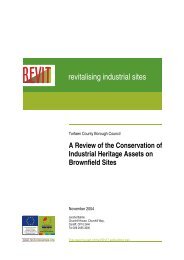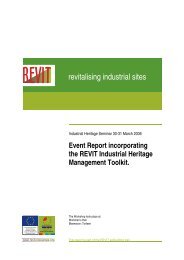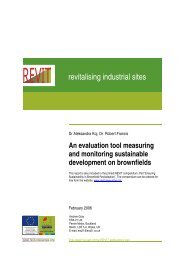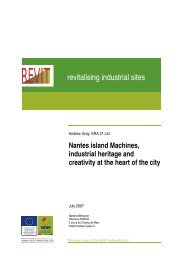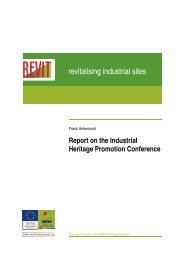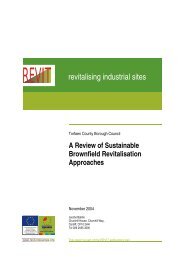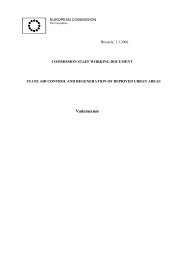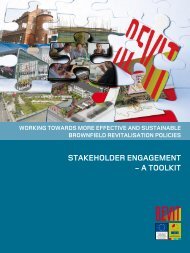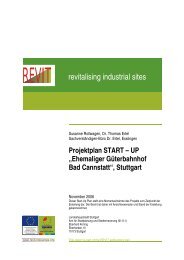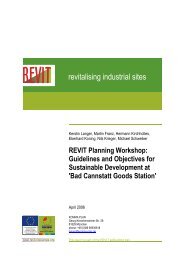Final announcement - REVIT
Final announcement - REVIT
Final announcement - REVIT
You also want an ePaper? Increase the reach of your titles
YUMPU automatically turns print PDFs into web optimized ePapers that Google loves.
Towards More Effective And Sustainable Brownfield Revitalisation Policies<br />
<strong>Final</strong> <strong>announcement</strong><br />
2 nd International Conference on Managing Urban Land<br />
April 25 th – 27 th 2007 Theaterhaus Stuttgart
Patronage & Foreword<br />
Dr. Wolfgang Schuster<br />
Mayor of Stuttgart<br />
Prof. Dr. Danuta Hübner<br />
EU Commissioner for<br />
Regional Policy<br />
a warm welcome to the 2 nd international<br />
conFerence on managing urban land<br />
Welcome to the city of Stuttgart, Capital of the state of Baden-Württemberg. The issues that will<br />
be addressed at the 2nd International Conference on Managing Urban Land are of great importance<br />
to all local and regional authorities both in Europe and in the rest of the world. How can we succeed<br />
in promoting employment and growth without consuming additional resources? How can we use<br />
urban brownfields in order to revitalizes and modernizes our cities? I am delighted that Stuttgart<br />
has the privilege to serve as venue for this major conference.<br />
We see ourselves as an international city and are therefore very much interested in an exchange<br />
on the European and international levels. In Stuttgart people from over 170 nations live together<br />
in peaceful coexistence. Over 100 languages are spoken here. Over the years, we have built up<br />
numerous networks on subjects ranging from mobility, to social integration policies, development<br />
aid, child friendliness or the challenges posed by demographic change. It is our firm belief that the<br />
best solutions arise from an exchange of best-practice examples. Over and above this, transnational<br />
co-operation has the advantage that it fosters closer links between and mutual understanding for<br />
one another thus helping promote peace through-out the world.<br />
I want to invite all delegates, conference schedule permitting, to take time out to discover our city.<br />
Stuttgart is the “European Capital of Sport 2007” and the host city for four world championships as well<br />
as venue for the World Athletics <strong>Final</strong>. In the autumn, just a stone’s throw away from Stuttgart International<br />
Airport, Stuttgart‘s New Trade Fair Center will open its doors to the public. It is designed as a showcase<br />
for the export-oriented companies of Baden-Württemberg. Explore our city, its theatres and museums, its<br />
parks and recreational opportunities!<br />
I wish you a rewarding stay in Stuttgart!<br />
Best wishes<br />
Dr. Wolfgang Schuster, Mayor of Stuttgart<br />
The aim of the <strong>REVIT</strong> project – development of new concepts for sustainable regeneration of<br />
brownfield sites – represents one of the major challenges for European cohesion policy: creating<br />
the conditions for sustainable jobs and growth as well as preserving the environment.<br />
In many European cities, there are brownfield areas which need to be revitalised in order to attract<br />
new jobs and investment and to improve the quality of life. I am therefore very pleased about this<br />
important initiative launched by six European partners (Hengelo, Medway, Nantes, Stuttgart, Tilburg,<br />
Torfaen). By sharing experience and by developing new innovative approaches on brownfield<br />
regeneration they can enhance urban development throughout Europe.<br />
I am delighted that the INTERREG „North West Europe“ programme has contributed to the success of<br />
the <strong>REVIT</strong> project. This form of co-operation is part of what Europe does best. Bringing people together<br />
to share ideas and to work together to make them happen. <strong>REVIT</strong> concludes as we embark on a new<br />
programming period 2007-2013 for European cohesion policy. In this period we will further strengthen<br />
networking and mutual learning between regions and cities. In fact, the European Commission has<br />
recently launched a new initiative called „Regions for Economic Change“ to boost the dissemination of<br />
best practice in economic modernisation and innovation across the Union. I would be delighted if the<br />
lessons learned from the <strong>REVIT</strong> network could find their place in this new initiative.<br />
Danuta Hübner<br />
Member of the European Commission responsible for Regional Policy
Dr. Annette Schavan<br />
Federal Minister for<br />
Education and Research<br />
The rapid development of towns and cities is leading to urban sprawl in Germany. While there<br />
are currently more than 2,000 square kilometres of urban brownfield sites, a total area of about<br />
310 square kilometres is newly developed for transport and housing every year – this is roughly<br />
equivalent to the size of Munich. It is therefore an important public task to ensure that brownfield<br />
sites are made available for housing, industry and transport. Only in this way can we protect our<br />
landscape and preserve our natural and cultural heritage and thus maintain, improve and shape<br />
our quality of life and development potentials.<br />
In order to recycle brownfield sites, a number of different aims such as protection of the<br />
environment and nature conservation, economic growth as well as the provision of socially<br />
compatible housing, quality of urban building and mobility must be brought into harmony.<br />
Particular attention must be paid to the successful remediation of the contaminated sites<br />
of old smelting plants, gas works, chemical plants and explosives manufacturing plants.<br />
It is our aim to reduce the present use of greenfileds for housing and transport to one third<br />
(30 hectares per day) by the year 2020.<br />
The funding priority „Research for the Reduction of Land Use and for Sustainable Land Use<br />
Management (REFINA)” of the Federal Ministry of Education and Research is part of the<br />
Federal Government’s national sustainability strategy. With this programme we will support<br />
projects for efficient land use which develop and implement, in particular, utilisation<br />
concepts for brownfield sites in city centres with a total of about 20 million Euro.<br />
The programme is funding projects which develop and implement exemplary innovative<br />
approaches for the redevelopment of brownfields in the future.<br />
Innovations are, however, generated mostly at the interfaces of different disciplines.<br />
Co-operation between different disciplines is therefore of outstanding importance for<br />
changing course in the use of natural resources.<br />
The challenges in front of us cannot be mastered at national level alone. The 7th Research<br />
Framework Programme offers an excellent platform for European co-operation.<br />
The aim of the 2nd International Conference on Managing Urban Land is to bring together<br />
a wide spectrum of experts and disciplines in the field of the management of urban land.<br />
The emphasis will be on exchanges of experience about proven methods, innovative solutions<br />
and applications of new technologies and tools. First results of projects funded under REFINA<br />
will also be presented. I wish all those taking part in the conference every success and many<br />
new ideas for your further work.<br />
Dr. Annette Schavan, MP<br />
Federal Minister for Education and Research
main obJectiVes & ParticiPants<br />
The management of urban land poses a variety of challenges<br />
for many stakeholders. Sustainable land management can<br />
stimulate investment, generate jobs and positively affects<br />
the quality of life positively. It contributes to the preservation<br />
of cultural and industrial heritage and helps to clean up and<br />
restore the environment. Last, but not least, it keeps urban<br />
life in urban agglomerations, restricts the extent of urban<br />
sprawl and minimises transportation and traffic needs. The<br />
current situation in many countries of the world indicates<br />
a growing need to exchange best practice approaches for<br />
land management. Land consumption, urban brownfields<br />
and urban sprawl are significant topics for various political<br />
initiatives.<br />
We invite you to participate in the 2nd International<br />
Conference on Managing Urban Land.<br />
It will bring together a wide range of professionals managing<br />
urban land to share best practice experience, problemsolving<br />
knowledge and the application of new techniques<br />
and tools. Current thinking and future trends in innovative<br />
land management will be highlighted and new approaches<br />
for public and private sector decision-making will be explored.<br />
The outcome of the conference will formally contribute<br />
to a number of European research activities and funding<br />
programmes in the field of European regional development.<br />
conFerence themes<br />
Integrated urban land management<br />
Economic dimensions of urban land<br />
management<br />
Environmental dimensions of urban land<br />
management<br />
Sustainability indicators<br />
Social dimensions of urban land management<br />
and community involvement<br />
The Conference will be the seminal event in 2007 for<br />
organisations involved in brownfield redevelopment.<br />
The conference and its accompanying exhibition will<br />
provide a platform for showcaseing innovative products<br />
and services to key stakeholders, including leading<br />
industry and public sector representatives.<br />
Please visit the conference website for further information<br />
and updates: www.revit-cabernet.org<br />
the Programme committee strongly<br />
encourages multi-stakeholder<br />
ParticiPation From:<br />
Planners and architects<br />
Professional advisers, facilitators and consultants<br />
Representatives from municipalities and<br />
development agencies<br />
Landowners and real-estate managers<br />
Developers, surveyors and valuers<br />
Bankers, insurers and investors<br />
Stakeholders from economy and public administration<br />
Researchers<br />
Lawyers<br />
Citizens‘ groups and Non Governmental Organisation<br />
representatives (NGO)<br />
Regulation, governance and legal issues<br />
Best Practice – Case studies<br />
REFINA – a German research programme for<br />
Brownfield revitalisaton<br />
Brownfield revitalisation in future European<br />
funding programmes<br />
US-Experiences and world-wide activities<br />
Re-use of industrial heritage
organising committee<br />
Thomas Zügel (Chair), <strong>REVIT</strong> Lead Partner, Municipality of<br />
Stuttgart, Germany<br />
Dr. Thomas Ertel, <strong>REVIT</strong> Coordination-Team, Consultant,<br />
Germany<br />
Dr. Uwe Ferber, CABERNET, Consultant, STADT+, Germany<br />
Gritta Geffers, <strong>REVIT</strong> Lead Partner, Municipality of<br />
Stuttgart, Germany<br />
Programme committee<br />
Detlef Grimski (Chair), Federal Environmental Agency,<br />
Germany<br />
Jean Audouin, Agence Innovapresse Paris, France<br />
Peter Conradi, Architect, MdB 1972 - 1998, Germany<br />
Dr. Fabian Dosch, Federal Office for Architecture<br />
& Regional Planning, Germany<br />
Dr. Uwe Ferber, Consultant, STADT+, Germany<br />
Bertil Grundfelt, Managing Director Kemakta Konsult AG,<br />
Sweden<br />
Peter Morgan, Groundworks UK, United Kingdom<br />
Dr. Paul Nathanail, University of Nottingham, United<br />
Kingdom<br />
Dr. Francesca Neonato, PN Studio Milano,<br />
Italy<br />
REFINA<br />
The programme<br />
“Research for the<br />
reduction of land<br />
consumption and for promoting sustainable<br />
land management” funded<br />
by the BMBF, the Federal Ministry of<br />
Education and Research, is part of the<br />
German National Strategy for Sustainable<br />
Development. The German<br />
Federal Government has set a goal of<br />
reducing land consumption for settlement<br />
and transport to 30 hectares<br />
per day in 2020. In order to provide a<br />
scientifically reliable basis for decisions<br />
and measures, REFINA grants the<br />
development and testing of innovative<br />
concepts for the reduction of land<br />
consumption to achieve a multitude<br />
of goals such as e.g. protection of the<br />
environment and nature, economical<br />
growth, socially balanced housing, architectural<br />
urban quality, and mobility.<br />
organising & Programme committee<br />
Detlef Grimski, CABERNET, Federal Environmental Agency,<br />
Germany<br />
Maike Hauschild, Project Management Juelich (PTJ), Germany<br />
Gerard Jilleba, <strong>REVIT</strong>, Municipality of Hengelo, Netherlands<br />
Dr. Kate Millar, University of Nottingham, United Kingdom<br />
Dr. Paul Nathanail, CABERNET, University of Nottingham,<br />
United Kingdom<br />
Prof. Dr. Nico S. Groenendijk, University of Twente, Netherlands<br />
Euan Hall, Land Restoration Trust, United Kingdom<br />
Maike Hauschild, Project Management Agency Juelich,<br />
Germany (PTJ)<br />
Prof. Dr. Dagmar Petrikova, University of Bratislava,<br />
Slovak Republic<br />
Dr. Anna Starzewska-Sikorska, Institute for Ecology of<br />
Industrial Areas, Poland<br />
Dr. Paul Syms, English Partnerships, United Kingdom<br />
Dr. Derk van Ree, Stichting GeoDelft, Netherlands<br />
Martin Schamann, Federal Environmental Agency Vienna,<br />
Austria<br />
Ann Vega, United States Environmental Protection Agency<br />
(USEPA), USA<br />
CABERNET is a European<br />
multi-stakeholder expert network<br />
– originally funded by the EC –<br />
that is working to enhance the<br />
rehabilitation of brownfield sites<br />
within the context of sustainable<br />
development of European cities.<br />
CABERNET explores new management<br />
strategies, innovative<br />
tools and stimulates co-ordinated<br />
research activities. CABERNET is<br />
jointly organised by the University<br />
of Nottingham and the Federal<br />
Environment Agency.<br />
Presented by<br />
<strong>REVIT</strong> – In every country<br />
and in almost every city of<br />
Europe, there are brownfield<br />
areas which need to be revitalised<br />
in order to preserve<br />
or improve the quality of urban living conditions.<br />
The revitalisation of brownfield sites<br />
may enhance coherent urban development,<br />
but can also create new employment and<br />
stimulate the local economy. Last but not<br />
least, revitalising brownfields for a variety<br />
of future uses preserves greenfield sites and<br />
prevents the growing consumption of land.<br />
Therefore <strong>REVIT</strong> strives to achieve a higher<br />
acceptance and better image for revitalised<br />
brownfield sites by testing their own<br />
models and tools on the local project areas<br />
of each partner and reporting best practice<br />
examples in this context to other cities and<br />
regions in Europe.
Vital elements oF the conFerence<br />
The large number of abstracts submitted reflect the strong<br />
interest in the conference topics. They contribute to a transdisciplinary<br />
thematic programme at two and a half days,<br />
facilitating knowledge transfer and the dialogue between<br />
research and practice. Strong support of the organisations<br />
involved and numerous sponsors enabled an attractive<br />
setting and framework programme around. Moreover high<br />
media coverage especially at the opening session and the<br />
exhibition ensures strong public perception and political<br />
attention.<br />
grand oPening oF conFerence<br />
and exhibition<br />
European Commissioner Hübner, Lord Mayor Schuster and<br />
the Minister for Economic Affairs of Baden-Württemberg<br />
Pfister will open the conference, followed by a first tour<br />
around the commercial exhibition. Afterwards a press conference<br />
is scheduled.<br />
Plenary keynote sessions<br />
11 keynotes in 3 plenary sessions will introduce to the thematic<br />
priorities of the conference. Moreover future EU funding<br />
schemes will be analysed and current activities related<br />
to the German EU-presidency will be highlighted.<br />
Parallel sessions<br />
32 lecture sessions, workshops and discussion rounds create<br />
the forum for knowledge transfer and dialogue on a broad<br />
range of topics at two and a half days.<br />
the Venue<br />
The new Theaterhaus Stuttgart is one of the most<br />
innovative cultural projects in Europe and contains a<br />
unique mixture of art, sport and social management.<br />
The new form of a theatrical institution.<br />
Art and sport, with a successful programme mixture of<br />
drama and dance theatre (inhouse ensembles), jazz, lite-<br />
commercial exhibition<br />
About 50 exhibitors representing developers, consultants<br />
and advisors, financial services, labs and technical experts,<br />
contractors, research organisations and professional associations<br />
as well as public bodies and municipalities will<br />
showcase their products and services to international land<br />
management stakeholders.In addition the 6 <strong>REVIT</strong> partnercities<br />
will present their local projects.<br />
inFo serVice FP7<br />
The National Contact Point Environment/Land Use of the<br />
BMBF / PTJ offers an advisory service for the 7th Framework<br />
Programme of the European Commission (FP7) with focus<br />
on urban systems, land use, soil mapping and environmental<br />
technologies. This service will provide an overview of<br />
new calls, activities and events in the Cooperation Specific<br />
Programme (6) Environmental including climate change.<br />
One to one sessions can be arranged at the REFINA stand on<br />
the 26 th and 27 th of April 2007.<br />
excursion, site Visits<br />
Tuesday and Friday afternoon an optional tour to highlights<br />
of inner urban development and regeneration within recent<br />
years in Stuttgart will be guided by an experienced urban<br />
planner of the Municipality of Stuttgart.<br />
social Programm<br />
Tuesday evening conference participants are invited to<br />
the Lord Mayors reception at the town hall. Conference<br />
dinner will be held Wednesday night at the Theaterhaus.<br />
Visiting Frühlingsfest at Thursday night will provide<br />
participants impressions of a traditional beer festival.<br />
rature, rock and pop music, cabaret, comedy and political<br />
discourses.<br />
On an area of around approx. 2,500sq.m there are three<br />
different sized theaters, a concert room, a sport hall,<br />
rehearsal rooms, a two-storey foyer, a restaurant with<br />
an openair-area. Situated in a former factory building,<br />
the “Theaterhaus Stuttgart” is both preserved industrial
Language of presentation Language of simultaneous translation Programme structure<br />
Day Time T1<br />
Presentations in English<br />
Simultaneous translation in<br />
German available<br />
24 th<br />
25 th<br />
26 th<br />
27 th<br />
T2<br />
Presentations in English<br />
Simultaneous translation in<br />
German available<br />
T3<br />
Presentations in English<br />
no translation<br />
15:00 - 18:00 Excursion (optional)<br />
19:30 Welcome Reception by Lord Mayor<br />
9:30 - 10:45<br />
Plenary Opening – Grand Opening – Welcome and opening of exhibition. or<br />
T4<br />
Presentations in English<br />
no translation<br />
Welcome by: Lord Mayor W. Schuster,<br />
European Commissioner for Regional Policy D. Hübner,<br />
Minister for Economic Affairs in Baden-Württemberg E. Pfister, MdL<br />
Glashaus<br />
Presentations in English<br />
no translation<br />
<strong>REVIT</strong> – Impact of an outstanding project, T. Zügel, CABERNET – Networking in Urban Land Management, P. Nathanail, Chair: T. Zügel<br />
10:45 - 11:15 Opening exhibition<br />
11:15 - 13:00<br />
Plenary Keynotes: European research, regional policy and social responsibility or<br />
K1 German research in urban regeneration - linked to international activities<br />
Staatssekretär E. Lütke-Daldrup (tbc), BMVBS<br />
K2 Brownfield regeneration activity in the Thames Gateway, B. Stoneman<br />
K3 Building Conservation as a Regional Innovation System, Ch. Gustafsson<br />
13:00 - 14:00 Lunch<br />
14:00 - 15:45<br />
16:15 - 18:00<br />
Evening<br />
9:00 - 10:45<br />
11:15 - 13:00<br />
1. The Mayor’s Round<br />
6. The <strong>REVIT</strong> story<br />
2. Integrated<br />
management<br />
7. Barriers and encouragement<br />
for integrated<br />
land mangement<br />
3. Objectives and indicators<br />
for sustainable<br />
urban revitalisation<br />
<strong>REVIT</strong> results<br />
8. Sustainable urban<br />
land management<br />
Conference Dinner at Theaterhaus<br />
4. Industrial heritage<br />
– assets for urban<br />
regeneration<br />
9. Legal aspects and<br />
policy development<br />
Press conference<br />
5. Common forum –<br />
Urban Soil Initiative<br />
Plenary Keynotes: Tools for integrated urban land management or or<br />
K4 „The Jessica Initiative“, M. Kollatz-Ahnen<br />
K5 Operacao Urban Diagonal Sul – Brownfield revitalization as a strategy for urban development, M. Pereira Nagalhaes Junior<br />
K6 Facilitating the implementation of environmental technologies, H. Vermeulen<br />
K7 Learning from Communities, L. Wren<br />
10. Experience in<br />
Brownfields revitalisation<br />
in Latin America<br />
11. US-Germany<br />
Bilateral working group<br />
for a sustainable future<br />
12. European platform<br />
for associations of<br />
brownfield experts<br />
13:00 - 14:00 Lunch<br />
14:00 - 15:45<br />
16:15 - 18:00<br />
Evening<br />
9:00 - 10:30<br />
11:00 - 12:15<br />
12:30 - 13:30<br />
15. Financial<br />
Instruments<br />
and their effects<br />
20. Brownfields and<br />
the real estate market<br />
21. Bonding and Bridging<br />
30. Social dimension of<br />
urban land management<br />
16. REFINA (Part 1)<br />
21. REFINA (Part 2)<br />
26. BW-day:<br />
Flächen gewinnen –<br />
Ressourcenschonende<br />
Siedlungsentwicklung<br />
in Baden-Württemberg<br />
31. BW- day: Innen vor<br />
außen – Chancen für<br />
Brachflächen durch<br />
Stadtentwicklung und<br />
Stadterneuerung<br />
Plenary Keynotes: Future Perspectives<br />
17. Brownfields<br />
revitalisation around<br />
the world<br />
22. Brownfields<br />
revitalisation around<br />
the word<br />
Frühlingsfest<br />
27. Stuttgart Partner<br />
Cities<br />
32. Best Practice Studies<br />
13. Challenges and<br />
opportunities in<br />
remediation of<br />
contaminated land<br />
18. Environmental<br />
Practice<br />
23. Technologies and<br />
tools to enhance the<br />
revitalization of<br />
contaminated land<br />
28. Towards a European<br />
environmental<br />
technology Verification<br />
system – an open stakeholder<br />
consultation<br />
33. Green Brownfields<br />
K8 Research related to brownfield revitalisation and urban development under FP7, C. Eccles<br />
K9 Challenges and perspectives for transnational cooperation 2007-2013, J. Eripret<br />
K10 Minimising land consumption – a key issue at local and regional scale, Environmental Minister T. Gönner<br />
K 11 The future of CABERNET, D. Grimski<br />
13:30 Quick Lunch<br />
Afternoon Excursion (optional)<br />
14. <strong>REVIT</strong> – Speculate<br />
PPP in practise<br />
19. Sustainable<br />
regional and spatial<br />
development<br />
24. LUDA Session<br />
32. EUBRA – Market<br />
place of project ideas<br />
34. Towards strategic<br />
land use management –
2 pm - 3:45 pm 11:15am<br />
9:30 am<br />
Wednesday 25 th April 9:30 am - 10:45 pm<br />
Grand Opening, Welcome and<br />
opening of exhibition<br />
Chair: T. Zügel, City of Stuttgart (D)<br />
Welcome by<br />
• Lord Mayor of the capital city Stuttgart<br />
Wolfgang Schuster<br />
• EU-Commissioner for Regional Policy Danuta Hübner<br />
Wednesday 25 th April 11:15 am - 13:00 pm<br />
Plenary Keynotes: European research,<br />
regional policy and social responsibility<br />
Venue: T1<br />
Chair: Uwe Ferber, Projektgruppe<br />
Stadt+Entwicklung, Leipzig (D)<br />
Wednesday 25 th April 2 pm - 3:45 pm<br />
Session 1: The Mayor’s Round<br />
Effects of European funding in urban regeneration –<br />
impacts and future perspectives<br />
Venue: T1<br />
Chair: Peter Conradi, Architect, MdB 1972 - 1998 (D)<br />
Introduction: Cohesion Policy 2007-2013 from an urban<br />
development perspective<br />
• Christian Huttenloher, German Association for Housing, Urban and<br />
Spatial Development, Head of Brussels Office, Brussels (EU)<br />
• Jean-Loup Drubigny, Directeur Secrétariat URBACT, Saint Denis la Plaine (F)<br />
Statements of participants<br />
Participants:<br />
•Elected members from the <strong>REVIT</strong> partner cities Nantes (F),<br />
Medway (UK), Torfaen (UK), Tilburg (NL), Hengelo (NL) and Stuttgart (D)<br />
•Municipal representatives from central and eastern member states<br />
•Joachim Baldermann Representative of the Ministry of Economic Affairs,<br />
Brussels (BE)<br />
Session 2: Integrated Management –<br />
Approaches & Tools<br />
Venue: T2<br />
Chair: Stephan Muzika, EPORA, St. Etienne (F)<br />
Regional Settlement Management as Chance for<br />
Sustainable Development<br />
Dirk Vallee, Verband Region Stuttgart, Stuttgart (D)<br />
Approach to brownfield revitalisation for small cities<br />
in the Czech Republic<br />
Ivan Vanicek, Technical University Prague, Prague (Cz)<br />
Online database on land management – an effective tool<br />
to support practitioner in land management and brownfield<br />
recycling<br />
Jantje Samtleben, TTI GmbH, Stuttgart (D)<br />
Rebuilding Suburban Detroit: Redevelopment Ready<br />
Communities (RRC): A Model Program<br />
Robin Boyle, Wayne State University Chair, Detroit Michigan (USA)<br />
Strategies and instruments to limit excessive land use<br />
in Germany - a proposal to the German National Council<br />
of Sustainable Development<br />
Barbara Malburg-Graf, University Stuttgart (D)<br />
day 1<br />
opening<br />
<strong>REVIT</strong> – Impact of an outstanding project<br />
• Minister for Economic Affairs in Baden-Württemberg<br />
Ernst Pfister, MdL<br />
Thomas Zügel, City of Stuttgart (D)<br />
CABERNET - Networking in urban land management<br />
Paul Nathanail, University Nottingham (UK)<br />
Opening of exhibition<br />
K1 German Research in urban regeneration –<br />
linked to international activities<br />
Engelbert Lütke-Daldrup, Staatssekretär (tbc), BMVBS, Berlin (D)<br />
K2 Brownfield Regeneration activity in the Thames<br />
Gateway<br />
Ben Stoneman, DCLG, London (UK)<br />
K3 Building Conservation as a Regional Innovation System<br />
Christer Gustafsson, Regional Museums of Halland, Halmstad (S)<br />
Session 3: Objectives and Indicators for<br />
sustainable urban revitalisation – <strong>REVIT</strong>-results<br />
Venue:T3<br />
Chair: Hermann J. Kirchholtes, City of Stuttgart (D)<br />
Objectives for Sustainable Brownfield Revitalisation<br />
and the Challenges for Community Participation<br />
Kerstin Langer KOMMA.PLAN, München (D)/ Martin Franz, University<br />
Bochum, Bochum (D)<br />
The <strong>REVIT</strong>-indicator-concept of a planning workshop<br />
Nils Krieger, City of Stuttgart (D)<br />
Tilburg: Environmental Profile and GPR Gebouw<br />
Paul Scherrenberg, Gert van den Elsen,City of Tillburg (NL)<br />
The <strong>REVIT</strong>-evaluation tool “Measuring and Monitoring<br />
Sustainable Development on Brownfield Sites”<br />
Andrew Gray, ERA 21, Torfaen (UK)<br />
Discussion<br />
Session 4: Industrial Heritage –<br />
assets for urban regeneration<br />
Venue: T4<br />
Chair: Gerard Jilleba, City of Hengelo, Hengelo (NL)<br />
Inspired by Industrial Heritage<br />
H.A.J.Henket, Henket & Partners architecten, Vught (NL),<br />
“The echo of a rich industrial past will resound in the future“<br />
Frank Ankersmid, City of Hengelo (NL)<br />
Industrial Heritage in a dockyard area<br />
Joanne Cable, Medway Coucil, Medway (UK)<br />
ERIH- European Route of Industrial Heritage<br />
Rainer Klenner, Ministerium für Bauen u. Verkehr NRW, Düsseldorf (D)<br />
Chance Denkmal – Innovative method to disperse<br />
historic buildings<br />
Hans-Peter Noll, MGG, Essen (D)<br />
Session 5: Common Forum –<br />
Urban Soil Intiative<br />
Venue: Glashaus<br />
Chair: Joop Vegter, Amstelveen (NL)<br />
Introductory keynote<br />
Joop Vegter, Common Forum Amstelveen (NL)<br />
Urban soil ecology, scientific perspectives I<br />
Wolfgang Burghardt, University of Essen (D)<br />
Urban soil ecology, scientific perspectives II<br />
Stefan Norra, University of Karlsruhe (D)<br />
Lessons learned from the Interreg IIIB Alpine Space Project<br />
TUSEC-IP ”Technique of Urban Soil Evaluation in City<br />
Regions – Implementation in Planning Procedures”<br />
Martin Schamann, Umweltbundesamt, Vienna (A)
Wednesday 25 th April 4:15 pm - 6 pm<br />
Session 6: The Revit Story<br />
Venue: T1<br />
Chair: Andrew Gray, ERA 21, Torfaen (UK)<br />
“The <strong>REVIT</strong> Story explores the development of new<br />
approaches and methods that have been worked up<br />
during the <strong>REVIT</strong> project, where project officers engaged<br />
in Brownfield Regeneration will give a “live” performance,<br />
in a unique presentation style, as to how they have tackled<br />
and managed three key elements of the project namely<br />
Stakeholder Engagement, Public Private Partnerships and<br />
Sustainable Development (including preserving and<br />
promoting Industrial Heritage).“<br />
Session 7: Barriers and encouragement<br />
for integrated land management<br />
Venue: T2<br />
Chair: Paul Syms, English Partnerships, London (UK)<br />
Sustainable regional land resource management<br />
Robert Holländer, University Leipzig, Leipzig (D)<br />
What is stopping sustainable brownfield development<br />
in England?<br />
Katie Williams, Oxford Institute for Sustainable Development, Oxford (UK)<br />
Smart Economic Growth – smart ways of spatial and<br />
economic development in metropolitan areas<br />
Sandra Pennekamp, Dagmar Cohrs, TU Darmstadt, Darmstadt (D)<br />
The Integration of Brownfield Remediation and<br />
Redevelopment Processes: the Relevance of Information<br />
Tiziana Cianflone, APAT, Rome (I)<br />
Site Value Management at the integrative land<br />
development project “Landau-Süd”<br />
Marika Denzer, ALSTOM Stuttgart (D)<br />
Session 8:<br />
Sustainable urban land management<br />
Venue: T3<br />
Chair: Francesca Neonato, PN Studio S.n.c., Milano (I)<br />
Thursday 26 th April 9 am - 10:45 am<br />
Plenary Keynotes Tools for integrated<br />
urban land management<br />
Venue:T1<br />
Chair: Gerhard Hauser, Manager Public Affairs,<br />
City of Tilburg (NL)<br />
K4 The Jessica Initiative<br />
Matthias Kollatz-Ahnen, Vice President, European Investment Bank (L)<br />
Thursday 26 th April 11:15 am - 1 pm<br />
Session 10: Experiences in Brownfields<br />
revitalisation in Latin America<br />
Venue: T1<br />
Chair: Detlef Grimski, UBA, Berlin (D)<br />
Introduction:<br />
Contaminated land management and Brownfield<br />
revitalization in Latina America – experiences, potentials<br />
and challenges<br />
Andreas Marker, Andreas Nieters, GTZ, Eschborn (D)<br />
Former railway-plan Aguascalientes, Cidade de Mexico –<br />
a case study<br />
Javier Llamas,University of Aguascalientes, (MEX)<br />
Ulises Ruiz, SEMARNAT, Mexico City (MEX)<br />
Contaminated land management within the Tamanduatey<br />
urban development project, Santo Andre, San Paulo<br />
Sebastiao Ney Vaz Junior, SEMASA, Santo Andre (BRA)<br />
Session 8:<br />
Sustainability assessment of Brownfield regeneration –<br />
a review of different approaches<br />
Martin Franz, Philipps- University Marburg, Marburg (D)<br />
Sustainability indicators for the Efficient Use of Land –<br />
optimising Densities in Urban and Rural Areas<br />
Robin Ganser, Oxford Brooks University (UK)<br />
Ineffective and Uncoordinated Urban Land use<br />
Management in the Developing World: the Case of Akure<br />
Afolabi Aribigbola, Department of Geography and Planning Sciences,<br />
Adekunle Ajasin University Akungba Akoko Ondo State (NIG)<br />
Innovative sites for bussiness and the service sector –<br />
quality aspects in urban land management<br />
Meinolf Bertelt-Glöß, LEG , Dortmund (D)<br />
Small city and big piece of cake – Sustainable land<br />
conversion under economical pressure: the case of<br />
Babenhausen casern<br />
Ute Knippenberger, FB Architektur of TU Darmstadt (D)<br />
Session 9:<br />
Legal Aspects and Policy Development<br />
Venue: T4<br />
Chair: Kyle Alexander, O.B.E., Leganside corporation, Belfast (UK)<br />
Liability and the Long Term: Effects on Sustainable Urban<br />
Regeneration in the UK and USA<br />
Peter Meyer, Northern Kentucky University and University of Louisville,<br />
Covington (USA)<br />
Towards Integrated Regeneration Policies and Brownfield<br />
Advocacy in the Czech Republic<br />
Gabrielle Hermann, Institut for Transportation and Development<br />
Policy Europe, Berlin (D)<br />
Contaminated Land Policy in Switzerland – Tackling the<br />
”sins of yesterday“ under the principle of appropriateness<br />
Christoph Wenger, Federal Office for the Environment, Bern (CH)<br />
Critical Considerations of Environmental Liability on<br />
Development and Implementation of the EU<br />
Douglas McCourt, Ater Wynne LLP, Portland (USA)<br />
Fiscal Impact Analysis of additional land-use –<br />
A tool for more municipal cost transparency<br />
Dirk Löhr, ZBF-UCB, Birkenfeld (D)<br />
K5 Operacao Urbana Diagonal Sul – Brownfield<br />
revitalization as a strategy for urban development<br />
Manuelito Pereira Nagalhaes Junior, SEMPLA, City of Sao Paulo, (BRA)<br />
K6 Facilitating the implementation of environmental<br />
technologies<br />
Harry J. Vermeulen,SKB, Gouda (NL)<br />
K7 Learning from Communities,<br />
Laura Wren, Academy for Sustainable Communities, Leeds (UK)<br />
Instruments and proceedings of Environmental Due<br />
Diligence and Brownfield revitalisation in the filed of<br />
habitation and urban development in Brazil<br />
CAIXA Economica Federal, GEURB- department of urban development (BRA)<br />
Experiences of cooperation between European and<br />
Latin-American cities in the field of Brownfield revitalisation<br />
Hermann J. Kirchholtes, Municipality of Stuttgart (D)<br />
day 2<br />
4:15 pm - 6 pm<br />
11:15 am - 1 pm 9 am
11:15 am - 1 pm<br />
2 pm- 3:45 pm<br />
Session 11: US - Germany Bilateral working<br />
group for a sustainable future<br />
Venue: T2<br />
Chair: Annette Gatchett, U.S. Environmental Protection<br />
Agency, Cincinnati, OH (USA)<br />
The US - German Bilateral Working Group: Collaborative<br />
Research for a Sustainable Future Results from Phase 3<br />
(2000-2005) and Beginning Phase 4 (2006-2010)<br />
Ann Vega, U.S. Environmental Protection Agency (USEPA)<br />
Overview of Regional Revitalisation Efforts in the US<br />
Douglas McCourt, Ater Wynne LLP, Portland (USA)<br />
Overview of Regional Development Efforts in Germany<br />
Kai Steffens, PROBIOTEC gmbH<br />
Next Steps Concerning Joint Cooperation<br />
Maike Hauschild, Dale Medearis, USEPA (USA)<br />
Session 12: Do we need a European Platform<br />
for Associations of Experts for Brownfield<br />
Redevelopment?<br />
Venue: T3<br />
Chair: H. Burmeier, ITVA, Berlin (D)<br />
Numerous European regulations refer to brownfield redevelopment<br />
business. Professionals and their organisations in<br />
the field of geotechnical, environmental or civil engineering,<br />
architecture and planning or real estate business are invited<br />
to contribute to various kinds of consultation processes.<br />
The fact remains that a unique “European Brownfields Association”<br />
does not exist. However coordination among the actors<br />
involved would help to raise the profile of brownfields<br />
among in legislative bodies and facilitate European standardisation.<br />
Participants invited by an initiative of the German<br />
scientific-technical association for Environmental Remediation<br />
and Brownfield Redevelopment ITVA will explore ways<br />
of future European cooperation of brownfield professionals.<br />
Session 13: Challenges and opportunities<br />
in remediation of contaminated land<br />
Venue: T4<br />
Chair: Erhard Robold, Arcadis Stuttgart (D)<br />
Redevelopment of industrial sites; an industry view<br />
on challenges and perspective<br />
A. Sinke, BP Int. Ltd, Sunbury-on-Thames (UK)<br />
CL:AIRE – Building Confidence in Remediation<br />
Jane Forshaw, CL:AIRE (UK)<br />
The Use of Innovative Remediation Technologies in<br />
Brownfield Redevelopment Projects<br />
Dr. Volker Schrenk, TTI GmbH, Stuttgart (D)<br />
Former freight depot Bad Cannstatt - Strategies for<br />
clearance of explosive ordnance disposal<br />
Hartmut Mezger, Geocon AER GmbH, Stuttgart (D)<br />
ThermoAir – an innovative remediation technology to<br />
reduce time and costs<br />
Gerd Wiedenbeck, U/C-tec GmbH, Walldorf (D)<br />
Session 14:<br />
<strong>REVIT</strong>- Speculate PPP in practice<br />
Venue: Glashaus<br />
Chair: A. Gray, ERA 21, Torfaen (UK)<br />
An opportunity for you to be a developer in a unique<br />
“game” approach workshop – you decide on your<br />
strategy – its fun!<br />
day 2<br />
Thursday 26th April 2 pm- 3:45 pm<br />
Session 15:<br />
Financial instruments and their effects<br />
Venue: T1<br />
Chair: Sultana Gruber, Bank Austria Creditanstalt, Vienna (A)<br />
Urban planning versus urban management –<br />
Capital market and urban planning as two tension poles<br />
for the development of urban sites<br />
Jürgen Brüggemann, MGG. Essen (D)<br />
Revolving Load Fund for Brownfield Regeneration –<br />
a financial perpetual mobile?<br />
Reinier M. Besemer, Dura Vermeer Business Development BV, Hoofddorp (NL)<br />
Developing a Model of Financing for Brownfield<br />
Redevelopment: How to Integrate Contamination and<br />
Legal & Political Risks?<br />
Lars Holstenkamp, University of Lüneburg, Lüneburg (D)<br />
An early assessment of JESSICA: love at first sight?<br />
Nico Groenendijk, University of Twente, Enschede (NL)<br />
Emerging investment principles for brownfield<br />
development: a case study<br />
Peter Vanneck, BROCAP nv, Gent (Wondelgem) (BE)<br />
Session 16: REFINA (Part 1)<br />
Venue: T2<br />
Chair: Uwe Wittmann, Projektträger Jülich, Berlin (D)<br />
The German R&D Programme REFINA: Aims, status and<br />
outlook<br />
Uwe Wittmann, Maike Hauschild, Projektträger Jülich, Berlin (D)<br />
Initiatives of the German Government in the frame<br />
National strategy for sustainability<br />
Gina Siegel, Uwe Taeger, BMVBS, BMU, BBR, Berlin (D)<br />
Session 16:<br />
The Research Network REFINA: Projects, Subjects and Players<br />
Stephanie Bock, Thomas Preuss, German Institute of Urban Affairs, Berlin (D)<br />
Management Development and Vegetation –<br />
Research Project about a Regional Park. Maintenance<br />
scheme for the Emscher Landscape Park (Ruhr Region,<br />
Germany)<br />
Jörg Dettmar, Peter Rohler, Technical University of Darmstadt, Darmstadt (D)<br />
3D-Virtual Environments as Media for the Management of<br />
Urban Land<br />
Lutz Ross, Technical University Berlin, Berlin (D)<br />
Development of participative evaluation and decision –<br />
making procedure for sustainable land management in<br />
rural areas<br />
Birgit Böhm, Mensch und Region, Hannover (D)<br />
Session 17:<br />
Brownfield revitalisation around the world<br />
Venue: T3<br />
Chair: Douglas Mc Court, Ater Wynne LLP, Portland (USA)<br />
Revitalisation of Former Industrial Sites in St. Petersburg<br />
Daniel Luchterhandt, Behörde für Stadtwicklung und Umwelt, Hamburg (D)<br />
The île de Nantes urban revitalisation project: focus on<br />
two outstanding projects<br />
Patrick Rimbert, Nantes Métropole, Nantes (F)<br />
Estimating potential and existing contaminated<br />
Brownfield sites, lessons from Japan.<br />
Tetsuo Yasutaka, Yokohama National University (J)<br />
Reactivation of Derelict Industrial Sites in Romania a<br />
Project of GTZ for Economic and Employment Promotion<br />
Doris Hirschberger, INGENIUS, Berlin (D)<br />
Model strategy for Redevelopment of closed landfills<br />
Rene Beijnen, Province of North-Brabant (NL)
Thursday 26 th April 2 pm - 3:45 pm<br />
Session 18: Environmental Practice<br />
Venue: T4<br />
Chair: Anja Sinke, BP Int. Ltd, Sunbury-on-Thames (UK)<br />
Integrated investigation and management of groundwater<br />
contamination – project MAGIC“<br />
Grzegorz Gzyl, GIG Katowice (PL)<br />
Innovative concenpt for revitalisation of a former petrol<br />
storage area in Bukarest – a pilot for eastern Europe<br />
Thomas Meyer Murlowsky, Züblin Umwelttechnik, Stuttgart (D)<br />
Recycling Requirements and conditions of degraded<br />
grounds in Poland – example of project conducted in<br />
Olsztyn (Northern Poland)<br />
Wojciech Irminski, Polish Geological Institute, Warsaw (PL)<br />
Brownfield-Recycling in Switzerland: eliminating contaminated<br />
sites and re-using derelict land at the same time<br />
Rolf Kettler, BAFU, Bern (CH)<br />
Remediation and the Regulatory Approach at Rochester<br />
Riverside<br />
Lucy Kirk , Environmental Protection Officer, Medway Council (UK)<br />
day 2<br />
Thursday 26th April 4:15 pm - 6 pm<br />
Session 20:<br />
Brownfields and the real estate market<br />
Venue: T1<br />
Chair: Gerard Jilleba, City of Hengelo (NL)<br />
Brownfields Redevelopment by combining bitter and sweet<br />
M.H. Nijboer, TAUW BV, Deventer (NL)<br />
Purchase and development of the Brownfield sites in<br />
Russia and Ukraine<br />
Piotr Poborski, WS Atkins Polska (PL)<br />
Environmental Exposure, Liability and Risk Transfer in<br />
Brownfield Transactions<br />
Simon Johnson, Global Environmental Insurance Partners, (UK)<br />
Public Private Partnership – solutions for brownfields?<br />
Frank Meininger, Christiane Stoye-Benk, Menold Bezler Rechtsanwälte<br />
Partnerschaft, Stuttgart (D)<br />
Pollution Insurance as a catalyst for successful brownfields<br />
development: the experience in the U.S., U.K., and<br />
Continental Europe<br />
Karl Russek, ACE Environmental Risk, ACE European Group Limited, London (UK)<br />
Session 21: REFINA (Part 2)<br />
Venue: T2<br />
Chair: Maike Hauschild, Projektträger Jülich, Berlin (D)<br />
Regional Planning as Innovative Land Use Management –<br />
the example of the Region Southern Upper Rhine<br />
Dirk Engelke, FLAIR project partners, Karlsruhe (D)<br />
Small and medium sized companies develop small and<br />
medium sized sites<br />
Volker Schrenk, TTI GmbH, Stuttgart (D)<br />
Sustainable land use management in the city of Hanover –<br />
a private sector fund model to mobilise brownfields and<br />
reserve building land<br />
Silke Kleinhückelkotten, Ecolog Institut, Hannover (D)<br />
Komreg – local authority land management in a regional<br />
perspective – the region of Freiburg<br />
Matthias Buchert, Öko-Institut e.V., Darmstadt (D)<br />
Demand-driven Life – Cycle Management of urban<br />
Neighbourhoods<br />
Sven Heilmann, University Göttingen (D)<br />
Military Conversion and Sustainable Land Use Management<br />
Christian Jacoby, University of the German Federal Armed Forces Munich (D)<br />
E-learning of the Dissemination of Research Results<br />
Nicole Okuniek, University of Bochum-ZEFIR, Bochum (D)<br />
Session 19: Sustainable Regional and<br />
Spatial Development<br />
Venue: Glashaus<br />
Chair: Bernd Scholl, Institute for Spatial and<br />
Landscape Development, ETH Zürich (CH)<br />
The economical use of land is the key aspect of every<br />
sustainable Spatial Planning and Development strategy.<br />
Central European countries facing stagnating or even<br />
decreasing population are still struggling to limit further<br />
expansion of settlement areas.<br />
Countries like Switzerland and Germany are currently<br />
adopting a Spatial Development strategy, which allows combining<br />
economic growth and limitation of settlement areas<br />
in a mid- and long-term perspective. This shall be achieved<br />
via the principle of “internal development before external<br />
development”, via regional land management, and complementary<br />
city networks. In a co-operative project between<br />
several regional planning authorities in the southwest of<br />
Germany, ministries of the state of Baden-Württemberg, the<br />
canton Basel-Landschaft, the university of Karlsruhe and as<br />
lead the professorship for spatial development at the Swiss<br />
Federal Institute of Technology are inventing cross-border<br />
sustainable regional land management .<br />
Session 22:<br />
Brownfield revitalisation around the world<br />
Venue : T3<br />
Chair: Paul Syms, English Partnerships, London (UK)<br />
Can we really compare Brownfield Regulation and<br />
Redevelopment in the US and EU?<br />
Peter Meyer, Northern Kentucky University and University of Louisville,<br />
Covington (USA)<br />
Guidelines for Brownfield remediation and<br />
redevelopment – a proposal<br />
Margherita Turvani, University of Venice, Venice (I)<br />
Brownfield indicators in Czech Republic<br />
Jan Votocek, IURS, Prague (Cz)<br />
The Value of Green Space: Exploring Ways to Evaluate the<br />
Benefits of Well Designed and Maintained Public Open<br />
Space<br />
Kate Millar, University of Nottingham, Nottingham (UK)<br />
Impact of Government Initiated Urban Land Management<br />
among Informal Labor Forces: A Case Analysis from a South<br />
Asian Megacity.<br />
Saleh Ahmed, University Karlsruhe, Karlsruhe (D)<br />
Session 23: Technologies and tools to Enhance<br />
the revitalization of contaminated land<br />
Venue : T4<br />
Chair: Rolf Gerhardt, Deutsche Bahn AG, Karlsruhe<br />
Research and Development for the Protection of Soil and<br />
Groundwater<br />
Jürgen Braun, VEGAS, Stuttgart (D)<br />
Technologies for Challenging Soil and Groundwater<br />
Contamination Problems<br />
Hans-Peter Koschitzky VEGAS, Stuttgart (D)<br />
Site Investigation Technologies and Monitoring:<br />
R&D Hand in Hand with Industry<br />
Nikolaus Rombach, Berghof Analytic and Environmental<br />
Engineering, Tübingen (D), Norbert Klaas, VEGAS, Stuttgart (D)<br />
Use of Integrated Planning Tools for Revitalisation<br />
SMARTe (U.S.) and START-UP Plan (Germany)<br />
Ann Vega & Jürgen Braun, US EPA & VEGAS, Stuttgart (D)<br />
Ex Situ, non-thermal and permanent remediation of soil/<br />
sediment contaminated by Persistent Organic Pollutants using<br />
a Solvent Extraction and Sonoprocess TM Treatment Chain.<br />
Paul Austin, Sonic Environmental Solutions Inc.,Vancouver (CAN)<br />
2 pm - 3:45 pm<br />
4:15 pm - 6 pm
9 am - 10:30 pm 4:15 pm<br />
11 am- 12:15 pm<br />
Session 24: LUDA Session<br />
Venue: Glashaus<br />
Chair: Dagmar Petrikova, Slovak University of Technology<br />
Bratislava, (SK)<br />
Improving the Quality of Life in Large Urban Distressed<br />
Areas – Results from the European Project LUDA<br />
Bernhard Müller, Paulina Schiappacasse, Leibniz Institut, Dresden (D)<br />
Friday 27 th April 9 am- 10:30 pm<br />
Session 25: Bonding and Bringing<br />
Venue: T1<br />
Chair: Erwin Lichtenberg, City of Tilburg (NL)<br />
Participatory planning and attractivity in tension:<br />
the case of Brussels<br />
Florence Delmotte, Facultes universitaires Saint-Louis, Bruxelles (BE)<br />
Creating young people friendly neighbourhoods<br />
Peter Morgan, Groundwork UK, Birmingham (UK)<br />
Effective Community Involvement Tools<br />
Sabine Martin, Kansas State University (USA)<br />
The application of the <strong>REVIT</strong> Toolkit and professionalism<br />
on community participation<br />
C. Gray, ERA 21, Torfaen (UK)<br />
Session 26: Baden-Württemberg Session<br />
Sustainable ressource management and urban and<br />
spatial development in Baden-Württemberg<br />
Venue: T2<br />
Chair: S. Gloger, Ministry of the Environment, Stuttgart (D)<br />
Funding programme for urban regeneration in<br />
Baden-Württemberg<br />
Representative of the Ministry for economic affairs (tbc) (D)<br />
The regional alliance „Flächen gewinnen“ land management<br />
in Baden-Württemberg<br />
Bernd Fahle, Architektenkammer BW, Freiburg (D)<br />
Intelligent land management and quality of life<br />
Martin Kessel, Umweltkompetenzzentrum Rhein- Neckar e.V., Heidelberg (D)<br />
Soil protection concept Stuttgart (BOKS) –<br />
approaches, objectives, strategies<br />
G. Wolff, City of Stuttgart (D)<br />
Session 27: Stuttgart Partner Cities<br />
Venue : T3<br />
Chair : D. Kron, Municipality of Stuttgart (D)<br />
Friday 27 th April 11 am- 12:15 pm<br />
Session 30: Social dimension of urban land<br />
management<br />
Venue: T1<br />
Chair: Euan Hall, Land Restoration Trust, UK,<br />
Examination and analysis of economic and social effects<br />
of inner-city brownfield redevelopment<br />
Birgit Memminger, ES EnviroSustain GmbH, Kirchheim unter Teck (D)<br />
Community participation at the remediation of a former<br />
ordnance factory<br />
Christian Weingran, HIM GmbH, Biebesheim (D)<br />
Making historic city centres attractive for sustainable utilisations<br />
– experiences of the INTERREG IIIB project ADHOC<br />
Stefan Celan, Mayor of the City of Ptuj, (Slovenia)<br />
Social dimension of urban land management and<br />
day<br />
community involvement<br />
3<br />
Ian McCarthy, Liverpool Vision, Liverpool (UK)<br />
Monitoring Quality of Life in Urban Regeneration<br />
Christiane Westphal, Leibniz Institut, Dresden (D)<br />
Selection of Assessment Methods for Evaluating the<br />
Sustainable Regeneration of Large Urban Distressed Areas:<br />
a Decision Support System<br />
Steve Curwell, Aleksandra Kazimierczak, University of Salford, (UK)<br />
LUDA project – an accompanying tool for urban<br />
development in Dresdens Weißeritz Area<br />
Andreas Wurff, Municipality of Dresden, Dresden (D)<br />
Session27:<br />
Inner urban development and brownfield revitalisation in Milan<br />
Carlo Masseroli, Milan (I)<br />
Regeneration of Brownfields in the City of Brno<br />
Marian Böhm, City of Brno (Cz)<br />
Brownfield regeneration – Cardiff Bay<br />
Julian Stedman, Head of Strategic Planning for Cardiff Council,<br />
City of Cardiff (UK)<br />
Session 28: Towards a European<br />
environmental technology verification<br />
system – an open stakeholder consultation<br />
Venue: T4<br />
Chair: Derk van Ree, GeoDelft, (NL)<br />
PROMOTE: Verifying the Performance of Environmental<br />
technologies – Monitoring and Remediation of Soil and<br />
Groundwater<br />
Thomas Track, Dechema Frankfurt (D)<br />
EURODEMO: demonstrating efficient soil and groundwater<br />
remediation<br />
Yvonne Spira, Umweltbundesamt, Vienna (A)<br />
Open discussion<br />
Session 29: European Brownfields Agenda<br />
(EUBRA) – Market place of project ideas<br />
Venue: Glashaus<br />
Chair: T. Ertel, Sachverständigen-Büro Dr. Ertel, Esslingen (D)<br />
EUBRA aims at bringing together the multifaceted activities<br />
related to the topic of „Brownfields“ from the several<br />
INTERREG co-operation zones as well as new knowledge<br />
of the RDT Framework Programmes. Based on this future<br />
funding needs will be explored and concrete new project<br />
ideas developed.<br />
Session 31: Baden-Württemberg Session<br />
Inner urban developmpent – chances for brownfield sites<br />
by urban development and regeneration<br />
Venue: T2<br />
Chair: Sieghart Gärttling, Wüstenrot Haus- und<br />
Städebau GmbH, Ludwigsburg (D)<br />
Process- and project management in urban regeneration<br />
Petra Menzel, LBBW Immobilien Kommunalentwicklung GmbH, Stuttgart (D)<br />
Project management and development in consideration of<br />
economic improvement<br />
Armin Dauner, Wüstenrot Haus- und Städtebau GmbH, Ludwigsburg (D)<br />
Recent experience with the funding programme<br />
”Stadtumbau West“ in Baden-Württemberg<br />
Jürgen Katz, LBBW Immobilien Kommunalentwicklung GmbH, Stuttgart (D)<br />
Social aspects in the restructuring of residential and<br />
commercial areas – the German Socially Integrative City<br />
Programme<br />
Gerhard Petermann, Wüstenrot Haus- und Städebau GmbH,<br />
Ludwigsburg (D)
Friday 27 th April 11 am - 12:15 pm<br />
Session 32: Best Practice Studies<br />
Venue: T3<br />
Chair: P. Maebe, OVAM , Mechelen (BE)<br />
Transformation of a Brownfield into an attractive Urban Land,<br />
Ostrava, Czech Republic<br />
Kristina Schejbalova, Earth Tech Cz s.r.o. Prague (CZ)<br />
Cases of revitalisation of urban areas as example of<br />
integrated urban land management<br />
Anna Starzewska- Sikorska, Institut for Ecology of Industrial Arias, Katowice (PL)<br />
Conversion of the former Buckenberg- Barracks<br />
Oliver Lamprecht, Entwicklungsgesellschaft, Pforzheim (D)<br />
Airfield Böblingen/Sindelfingen – Transformation of a<br />
former military site into a new city quarter<br />
Karl Noe, ARCADIS, Stuttgart (D)<br />
Session 33: Green Brownfields<br />
Venue: T4<br />
Chair: Kate Millar, University of Nottingham, Nottingham (UK)<br />
Friday 27 th April 12:30 pm - 1:30 pm<br />
Plenary Keynotes Future Perspectives<br />
Venue: T1<br />
Chair: Alexander Kreher, City of Stuttgart (D)<br />
K8 Research Related to Brownfield Revitalisation and<br />
Urban Development under FP7<br />
Cathy Eccles, Programme Officer The European Commission DG Research<br />
welcome recePtion<br />
Dr. Wolfgang Schuster, Lord Mayor of the capital city Stuttgart,<br />
invites all participants to the official reception at the<br />
town hall on the 24 th April 2007, 7.30 p.m. This reception<br />
will be a good opportunity to meet in a more informal way,<br />
following the welcome.<br />
conFerence dinner<br />
The Conference Dinner will be held Wednesday at 8 p.m.<br />
in the atmospheric venue of the Theaterhaus Stuttgart.<br />
Indulge yourself with a multi-course buffet and a selection<br />
of several wines. Our DJ will then transform the “Glashaus”<br />
into a disco were you will have the chance to dance!<br />
FrÜhlingsFest<br />
On the 26 th April 2007 the largest Frühlingsfest in<br />
Europe invites you to the Cannstatter Wasen in Stuttgart.<br />
We reserved especially for conference participants one of<br />
the “Cannstatter Stüble“ in the “Stuttgarter Hofbräu” beer<br />
tent, starting at 6 p.m.<br />
Session 33:<br />
Non-viable Brownfield sites and the potentials of<br />
urban-industrial woodlands in the Ruhr<br />
Orhan Güles & Gisela Prey, Ruhr-University Bochum, Bochum (D)<br />
The “Green Brownfield” approach<br />
Herbert Klapperich, Interdisciplinary Center of Excellence for Brownfields,<br />
Freiberg (D)<br />
Benefits of high quality Landscapes on Brownfield land<br />
Bernd Mielke, Institut für Landes- und Stadtentwicklungsforsch. (D)<br />
Sustaining Green Space Investment<br />
Peter Morgan, Groundwork UK, Birmingham (UK)<br />
Session 34: Towards Strategic Land use<br />
Management<br />
Venue: Glashaus<br />
Chair: Uwe Ferber, Projektgruppe Stadt & Entwicklung, Leipzig (D)<br />
Panel for the dicussion of a new EU objective 3 transnational project<br />
Organiser: Bundesamt für Raumordnung und Bauwesen (BBR), Germany<br />
K9 Challenges and perspectives for transnational<br />
cooperation 2007-2013<br />
day 3<br />
Julia Eripret, Project Development Officer, INTERREG IV B NWE, JTS Lille (F)<br />
K10 Minimising land consumption –<br />
a key issue at regional scale<br />
Tanja Gönner, Umweltministerin Baden Württemberg, Stuttgart (D)<br />
K11 The future of CABERNET<br />
Detlef Grimski, Umweltbundesamt, Berlin (D)<br />
social eVents<br />
You will be able to sample crispy chicken and other swabian<br />
gastronomic specialities. The band FRONTAL will be playing<br />
music of the seventies, eighties, Rock & Pop.<br />
excursion by bus<br />
The tour will lead to several brownfield sites, which are<br />
important potentials for a sustainable inner urban<br />
development in Stuttgart. The efforts of the city of<br />
Stuttgart to maximise these potentials will be demonstrated.<br />
The tour will also visit new urban development projects.<br />
The manager of the project “Sustainable Brownfield<br />
Development Stuttgart (NBS)“ will guide the tour, which<br />
will provide unique perspectives of Stuttgart.<br />
registration counter<br />
Our registration desk will be open on Tuesday from 2 – 6.30<br />
p.m. Make use of our service to register and receive the<br />
conference materials one day before the conference starts –<br />
just combine it with the bus excursion!<br />
11 am - 12:15 pm<br />
12:30 pm
exhibition<br />
The accompanying exhibition provides you with the<br />
opportunity to showcase your products and services<br />
to key international land management stakeholders,<br />
including leading industry and public sector<br />
representatives.<br />
The exhibition provides organisations with an unique<br />
opportunity to network and look for partners for new<br />
business. The Theaterhaus Stuttgart offers ideal space<br />
with connection to conference rooms and the exhibition<br />
foyer.<br />
Exhibition space and stands are still available. If you<br />
are interested, please contact us as soon as possible.<br />
E<br />
D<br />
Exhibition Hall<br />
Eingang Eingang<br />
C B A<br />
Engaged<br />
registered exhibitors<br />
Analytical Labs<br />
• AGROLAB Labor GmbH<br />
Contractors:<br />
• U/C-tec GmbH<br />
• Lindner AG<br />
• Züblin Umwelttechnik GmbH<br />
• Bauer & Mourik<br />
Umwelttechnik GmbH<br />
• CTK, Computer Technik Kress<br />
GmbH<br />
Consultants & Advisors:<br />
• ARCADIS Consult GmbH<br />
• BoSS Consult GmbH<br />
• ALSTOM Power Environmental<br />
Consult GmbH<br />
• Sachverständigen-Büro<br />
Dr. Ertel<br />
• KKWP Kasper, Knacke,<br />
Wintterlin & Partner<br />
• CDM Consult GmbH<br />
• CPM GmbH Gesellschaft<br />
für Projektmanagement<br />
• Ernst & Young<br />
Prof. Weiss & Partner<br />
Projektsteurungsgesellschaft<br />
mbH<br />
• UW Umweltwirtschaft GmbH<br />
• GEOCON AER GmbH<br />
• Weber-Ingenieure GmbH<br />
• Dekra Umwelt GmbH<br />
• URS Deutschland GmbH<br />
• ACE-INA<br />
• Menold Bezler<br />
Rechtsanwälte<br />
Developers:<br />
• Planungs- und Projektentwicklungsgesellschaft<br />
Dr. Eisele mbH<br />
• Wüstenrot Haus und<br />
Städtebau GmbH<br />
• SWSG Stuttgarter<br />
Wohnungs- und Städtebaugesellschaft<br />
mbH<br />
• LBBW Immobilien<br />
Kommunalentwicklung<br />
GmbH<br />
Research & Associations:<br />
• Altlastenforum<br />
Baden-Württemberg<br />
• ITVA Ingenieurtechnischer<br />
Verband Altlasten e.V.<br />
• Polish Geological Institute,<br />
Warsaw (PL)<br />
• PROMOTE (FP 6- Project)<br />
• REFINA (BMBF; BMVBS;<br />
BMU;BBR;UBA;PTJ)<br />
• VEGAS Versuchseinrichtung<br />
zur Grundwasser-<br />
und Altlastensanierung<br />
Municipalities:<br />
• Landeshauptstadt<br />
Stuttgart (D)<br />
• Gemeente Hengelo (NL)<br />
• Gemeente Tilburg (NL)<br />
• Torfaen County Borough<br />
Council (UK)<br />
• Medway Council (UK)<br />
• Nantes Métropole (F)
accommodation<br />
Availability of hotel rooms may be limited as another major<br />
exhibition is taking place in Stuttgart in the same week.<br />
Therefore please use our convenient reservation service<br />
and book early. After receiving your reservation the<br />
Conference Secretary will be sending out a confirmation<br />
and the invoice.<br />
We have selected the following hotels in which we have<br />
reserved room contingents:<br />
1<br />
2<br />
3<br />
5<br />
4<br />
traVelling to stuttgart<br />
Arrival by plane at Stuttgart Airport<br />
The subway is located directly under Terminal 1 and brings<br />
you to the city center and to the main railway station in<br />
about 25 minutes. Furthermore there are numerous taxis,<br />
car rental companies and busses offering transfers<br />
(www.stuttgart-airport.com).<br />
Arrival by plane at Frankfurt am Main Airport<br />
The trains of the Deutsche Bahn AG depart from the airport<br />
and provide a direct connection taking about 75 minutes to<br />
the main railway station in Stuttgart (see registration form<br />
Section E). From there direct subway connections take you<br />
to the Conference Venue in about 10 minutes (www.airportcity-frankfurt.com).<br />
Subway<br />
Departing from the main railway station in Stuttgart<br />
the conference venue can be reached within 10 minutes by<br />
taking the subways U5, U6 or U15. Exit at the station<br />
“Pragsattel”.<br />
6<br />
Messehotel 1<br />
Europe<br />
Category: HHHH<br />
Rate (incl. Breakfast and<br />
taxes): 125 Euro (Single)<br />
The hotel is located within<br />
walk-ing distance of the<br />
Conference Venue. The subway<br />
takes about 10 minutes<br />
to the main station and<br />
city centre and a station is<br />
located close to the hotel.<br />
www.tagungshotel.com<br />
Kongresshotel 2<br />
Europe<br />
Category: HHHH<br />
Rate (incl. Breakfast and<br />
taxes):<br />
98 Euro (Single)<br />
130 Euro (Double)<br />
The hotel is located directly<br />
opposite the Conference<br />
Venue. The subway takes<br />
about 10 minutes to the<br />
main station and city centre<br />
and a station is located close<br />
to the hotel.<br />
www.tagungshotel.com<br />
traVel inFormation<br />
Etap Hotel 3<br />
Stuttgart City<br />
Category: H<br />
Rate (incl. Breakfast and<br />
taxes):<br />
58,50 Euro (Single)<br />
68,50 Euro (Double)<br />
The hotel is located directly<br />
opposite the Conference<br />
Venue. The subway takes<br />
about 10 minutes to the<br />
main station and city centre<br />
and a station is located close<br />
to the hotel.<br />
www.etaphotel.com<br />
Hotel Ibis Stuttgart 4<br />
am Löwentor<br />
Category: HH<br />
Rate (incl. Breakfast and<br />
taxes):<br />
102,50 Euro (Single)<br />
122,50 Euro (Double)<br />
The hotel is located halfway<br />
on a direct line between city<br />
centre and Conference<br />
Venue.<br />
www.accorhotels.com<br />
Mercure Hotel 5<br />
Stuttgart City<br />
Center<br />
Category: HHH<br />
Rate (incl. Breakfast and<br />
taxes): 129 Euro (Single)<br />
139 Euro (Double)<br />
The hotel is located 600<br />
meters from the city<br />
centre and close to the main<br />
railway station.<br />
Direct public transport<br />
available to the Conference<br />
Venue.<br />
www.mercure.com<br />
Mercure Stuttgart 6<br />
Bad Cannstatt<br />
Category: HHHH<br />
Rate (incl. Breakfast and<br />
taxes): 89 Euro (Single)<br />
109 Euro (Double)<br />
The hotel is located in<br />
Stuttgart-Bad Cannstatt.<br />
The subway station is<br />
located near the hotel and<br />
it takes about 15 minutes to<br />
the Conference Venue or to<br />
the main station and city<br />
centre.<br />
www.mercure.com<br />
Arrival by car<br />
Arriving via Munich: A8 exit Stuttgart-Degerloch, B27<br />
direction Stuttgart Zentrum (city centre), Hohenheimer<br />
Straße, Friedrich Straße, Heilbronner Straße, Siemensstraße.<br />
Arriving via Heilbronn: A81 exit Stuttgart-Zuffenhausen,<br />
B10 direction Stuttgart Zentrum (city centre), Heilbronner<br />
Straße, Siemensstraße.<br />
Arriving via Karlsruhe: A8, A81 exit Stuttgart-Feuerbach,<br />
B295 direction Stuttgart-Feuerbach, Föhrichstraße,<br />
Steiermärker Straße, Bludenzer Straße, Stuttgarter Straße,<br />
Tunnelstraße, Siemensstraße<br />
Arriving via Stuttgart-Vaihingen: B27 Friedrichstraße,<br />
Heilbronner Straße, Siemensstraße<br />
Parking<br />
Additional parking is available at the Conference Venue<br />
and the Trade Fair.
eVit & cabernet 2007 is sPonsored by<br />
ACE European Group LTA.,London | Wüstenrot Haus und Städtebau GmbH, Ludwigsburg<br />
SWSG Stuttgarter Wohnungs- und Städtebaugesellschaft mbH, Stuttgart | LBBW Immobilien Kommunalentwicklung GmbH, Stuttgart<br />
Prof. Weiss & Partner Projektsteuerungsgesellschaft mbH, Stutttgart<br />
ALSTOM Power Environmental Consult GmbH, Stuttgart | ARCADIS Consult GmbH, Stuttgart | Menold Bezler Rechtsanwälte, Stuttgart<br />
CTK Computer Technik Kress GmbH, Esslingen | CDM Consult GmbH, Alsbach<br />
For all matters related to registration and<br />
general information<br />
Conference Secretary<br />
Amt für Stadtplanung und Stadterneuerung<br />
Beate Deckert<br />
Eberhardstr. 10<br />
70173 Stuttgart<br />
Germany<br />
Telephone +49 (0) 711 216 3258<br />
Fax +49 (0) 711 21695 3258<br />
beate.deckert@stuttgart.de<br />
For all matters related to the conference programm,<br />
the exhibition and the framework of events<br />
<strong>REVIT</strong> Coordination Team<br />
Sachverständigen-Büro Dr. Ertel<br />
Boschstraße 10<br />
73734 Esslingen<br />
Germany<br />
Telephone +49 (0) 711 9 31 50 480<br />
Fax +49 (0) 711 9 31 50 485<br />
thomas@sv-ertel.de



